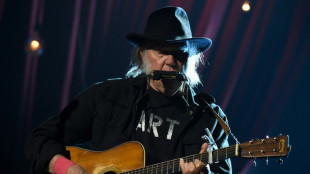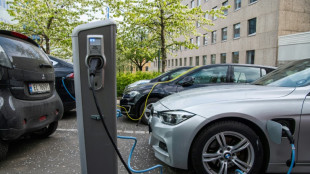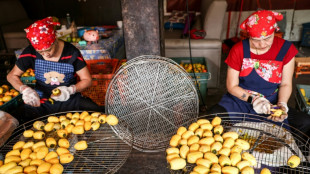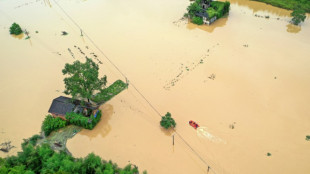
-
 Rosita Missoni of Italy's eponymous fashion house dies age 93
Rosita Missoni of Italy's eponymous fashion house dies age 93
-
27 sub-Saharan African migrants die off Tunisia in shipwrecks

-
 UK grime star Stormzy banned from driving for nine months
UK grime star Stormzy banned from driving for nine months
-
Neil Young dumps Glastonbury alleging 'BBC control'

-
 Swiatek battles back to take Poland into United Cup semis
Swiatek battles back to take Poland into United Cup semis
-
Electric cars took 89% of Norway market in 2024

-
 Rival South Korea camps face off as president holds out
Rival South Korea camps face off as president holds out
-
French downhill ace Sarrazin out of intensive care

-
 Djokovic cruises past Monfils as rising stars impress in Brisbane
Djokovic cruises past Monfils as rising stars impress in Brisbane
-
Montenegro mourns after gunman kills 12

-
 Sales surge in 2024 for Chinese EV giant BYD
Sales surge in 2024 for Chinese EV giant BYD
-
Agnes Keleti, world's oldest Olympic champion, dies at 103

-
 Andreeva, Mpetshi Perricard showcase Australian Open potential
Andreeva, Mpetshi Perricard showcase Australian Open potential
-
Afghan refugees suffer 'like prisoners' in Pakistan crackdown

-
 Coach tight-lipped on whether Rohit will play in final Australia Test
Coach tight-lipped on whether Rohit will play in final Australia Test
-
Blooming hard: Taiwan's persimmon growers struggle

-
 South Korea's impeached president resists arrest over martial law bid
South Korea's impeached president resists arrest over martial law bid
-
Knicks roll to ninth straight NBA win, Ivey hurt in Pistons victory

-
 'Numb' New Orleans grapples with horror of deadly truck attack
'Numb' New Orleans grapples with horror of deadly truck attack
-
Asia stocks begin year on cautious note

-
 FBI probes 'terrorist' links in New Orleans truck-ramming that killed 15
FBI probes 'terrorist' links in New Orleans truck-ramming that killed 15
-
2024 was China's hottest year on record: weather agency

-
 Perera smashes 46-ball ton as Sri Lanka pile up 218-5 in 3rd NZ T20
Perera smashes 46-ball ton as Sri Lanka pile up 218-5 in 3rd NZ T20
-
South Korea police raid Muan airport over Jeju Air crash that killed 179

-
 South Korea's Yoon resists arrest over martial law bid
South Korea's Yoon resists arrest over martial law bid
-
Sainz set to step out of comfort zone to defend Dakar Rally title

-
 New Year's fireworks accidents kill five in Germany
New Year's fireworks accidents kill five in Germany
-
'I'm Still Here': an ode to Brazil resistance

-
 New Orleans attack suspect was US-born army veteran
New Orleans attack suspect was US-born army veteran
-
Australia axe Marsh, call-up Webster for fifth India Test

-
 Jets quarterback Rodgers ponders NFL future ahead of season finale
Jets quarterback Rodgers ponders NFL future ahead of season finale
-
Eagles' Barkley likely to sit out season finale, ending rushing record bid

-
 Syria FM hopes first foreign visit to Saudi opens 'new, bright page'
Syria FM hopes first foreign visit to Saudi opens 'new, bright page'
-
At least 10 dead in Montenegro restaurant shooting: minister

-
 Arteta reveals Arsenal hit by virus before vital win at Brentford
Arteta reveals Arsenal hit by virus before vital win at Brentford
-
Palestinian Authority suspends Al Jazeera broadcasts

-
 Arsenal close gap on Liverpool as Jesus stars again
Arsenal close gap on Liverpool as Jesus stars again
-
Witnesses describe 'war zone' left in wake of New Orleans attack

-
 Cosmetic surgery aficionado Jocelyne Wildenstein dies aged 79: partner
Cosmetic surgery aficionado Jocelyne Wildenstein dies aged 79: partner
-
Tschofenig takes overall Four Hills lead after second leg win

-
 10 killed in New Year's truck ramming in New Orleans, dozens hurt
10 killed in New Year's truck ramming in New Orleans, dozens hurt
-
Leeds and Burnley held to draws as Windass hits Wednesday wonder strike

-
 New Orleans truck attack: what we know so far
New Orleans truck attack: what we know so far
-
Saudi executes at least 338 people in 2024: AFP tally

-
 Migrants crossing Channel to UK in 2024 soar by 25 percent
Migrants crossing Channel to UK in 2024 soar by 25 percent
-
Power restored to most of Puerto Rico: utility

-
 Seko Fofana joins Rennes after Saudi Arabia stint
Seko Fofana joins Rennes after Saudi Arabia stint
-
Brazil's Amazon saw highest number of fires in 17 years: agency

-
 McGregor wants no let-up as Celtic aim to maintain Old Firm grip
McGregor wants no let-up as Celtic aim to maintain Old Firm grip
-
Truck ramming kills 10 New Year's revelers in New Orleans, injures dozens


Main points of the $300 billion climate deal
The deal reached at UN climate talks in Azerbaijan ramps up the money that wealthy historic emitters will provide to help poorer nations transition to cleaner energy and adapt to global warming.
Here are the main points of the agreement reached at COP29 in Baku:
- $300 billion -
Under a framework established by the UN in 1992, 23 developed countries -- and the European Union -- historically responsible for most planet-heating emissions are obliged to contribute to climate finance.
The Baku accord raises the amount of money that developed countries must provide to at least $300 billion per year by 2035.
It is higher than the $100 billion that is currently required under a previous agreement that runs until next year.
But it falls well short of the $500 billion that some developing countries had demanded at the fraught negotiations in Baku.
The deal states that the money will come directly from a "wide variety of sources" including government budgets, private sector investment, and other financing.
It also cites "alternative sources" -- a reference to potential global taxes under discussion on the aviation and maritime industries, and the rich.
The hope is that the money from developed countries will help boost private investment to reach an ambitious goal -- written into the deal -- of delivering at least $1.3 trillion per year by the next decade.
That is the amount that experts commissioned by the United Nations said was needed by 2035.
"With these funds and with this structure, we are confident we will reach the 1.3 trillion objective," EU climate commissioner Wopke Hoekstra told fellow COP29 delegates.
- China role -
The United States and EU had pushed to broaden the donor base to include countries that are still listed as developing but have now become wealthy, such as China and Saudi Arabia.
But China, the world's second-biggest economy and top emitter of greenhouse gases, has steadfastly refused to change its status while recalling that it already provides bilateral aid.
The deal states that developed nations would be "taking the lead" in providing the $300 billion -- implying that others could join.
The text "encourages" developing countries to "make contributions" that would remain "voluntary".
There was one novelty: the climate finance that developing countries such as China provide via multilateral development banks will count towards the $300 billion goal.
"It is also a matter of fairness and of importance to us that all those with the ability to do so should contribute," Hoekstra said.
"Therefore it is good, given the size of the problem, that we enlarge the contributor base on a voluntary basis."
- Share of money -
The negotiations were also the scene of disagreements within the developing world.
The Least Developed Countries (LDCs) bloc had asked that it receive $220 billion per year, while the Alliance of Small Island States (AOSIS) wanted $39 billion -- demands that were opposed by other developing nations.
The figures did not appear in the final deal.
Instead, it calls for tripling other public funds they receive by 2030.
The next COP, in Brazil in 2025, is expected to issue a report on how to boost climate finance for these countries.
A.P.Maia--PC
